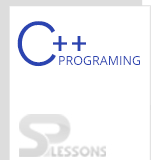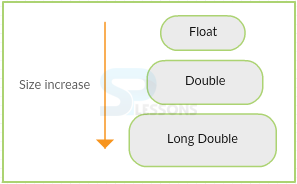 Description
Description
C++ Constants are same as the identifiers which are fixed values and cannot be modified once they are defined. CPP Constant is represented by a name in the program. This name can be used same as the variable name.
CPP Constant of type integer can be declared in the following two ways.
1) Defining CPP Constant with const keyword : const keyword is a modifier that can be applied to any variable declaration. A variable declared to be const cant be modified during program execution. It is only initialized only at the time of declaration.
Const int a=1;
Int const a=1;
2) Defining CPP Constant with #define directive : Directive #define is also used to declare the constants.
#define a 1 (pre-processor directive)
- When #define is used,all constants gets replaced with their actual values before compilation by the pre-processor and const is used by the compiler.
- #define is always global, const can be local(global also).
- #define does not have type checking where as type checking is part of const.
 Types
Types
| Constant | Type of Value Stored |
|---|---|
| Integer Constant | Stores integer value |
| Floating Constant | Stores float value |
| Character Constant | Stores character value |
| String Constant | Stores string value |
 Description
Description
An Integer constant may be "Decimal (base 10), Octal (base 8), or Hexadecimal (base 16) Number" that represents an integral value.
- A sign i.e. either + or – precedes the Integer constant
- They can suffixed with U or L or sometimes both. U represents “Unsigned integer constant” and L represents “Long integer constant”. UL represents “Unsigned Long Integer Constant”.
- "Spaces, Non-Digit Characters and Commas" are not allowed in integer constants
 Description
Description
Integer constants are of four types. Along with these four, there are other two constants called "Backslash Character and Wide Character Constant".
It takes values from "0 to 9" and sign is optional.
It represents a real integer value i.e it takes "Fractional, Decimal and Integer Values".
A character constant can be an "Alphabet, a Digit or a Single Special Symbol".
String constant is same as character constant, and can be enclosed in double quotes " ". There is no special datatype for string.
For example, char area= " A"; Here "char" is only used as datatype.
Backlash Constant is another constant that is used in C-language.
This should be started with backslash.
Wide Characters in C++ are declared using Wide Character Constants. The values up to 16 bits are allowed here. To make a constant wide character place" L "before it.
Syntax:
- Octal Integer Constant: It takes values form "0 to 7" and the sign that precedes the value is 0. For example: 0123.
- Hexadecimal Integer Constant: It takes values from "0 to 15" and the sign that precedes the value is 0x. For example: 0x123
- Float: They are defined using "float" keyword and takes two bytes of memory.
- Double: This is used when precision provided by the float is not sufficient and takes four bytes of memory.
- Long Double: This is used to extend further more compared to double and takes eight bytes of memory.
- This can hold a single character at a time and value should be enclosed in single quotes''.For example: char c='A'.
- Format specifier for character constant is %c.
| Symbol | Backslash Symbol |
|---|---|
| \b | Backspace |
| \v | Vertical tab |
| \" | Double Quote |
| \r | Carriage Return |
| \t | Horizontal Tab |
| \f | Form feed |
| \\ | Backslash |
| \? | Question Mark |
| \a | Alert or Bell |
| \' | Single Quote |
| \n | New line |
wchar_t character_name=L'character';
For example, wchar_t c=L'A';
 Example
Example
[c]
#include<iostream>
using namespace std;
int main()
{
const double pi=3.14159265;
double circumference;
int radius=3;
circumference=2*pi*radius;
cout << "circumference is " << circumference << endl;
return 0;
}[/c]
Output:
[c]circumference is 18.8496[/c]
 Key Points
Key Points
CPP Constant chapter draws out following important points.
- CPP Constant cannot be modified
- "Integer, Float, Character, Backslash and String" are constant types
- Wide characters can be used by placing L before the value.
 Programming Tips
Programming Tips
Always enclose string constants in double quotes only, otherwise it is considered as character value.




